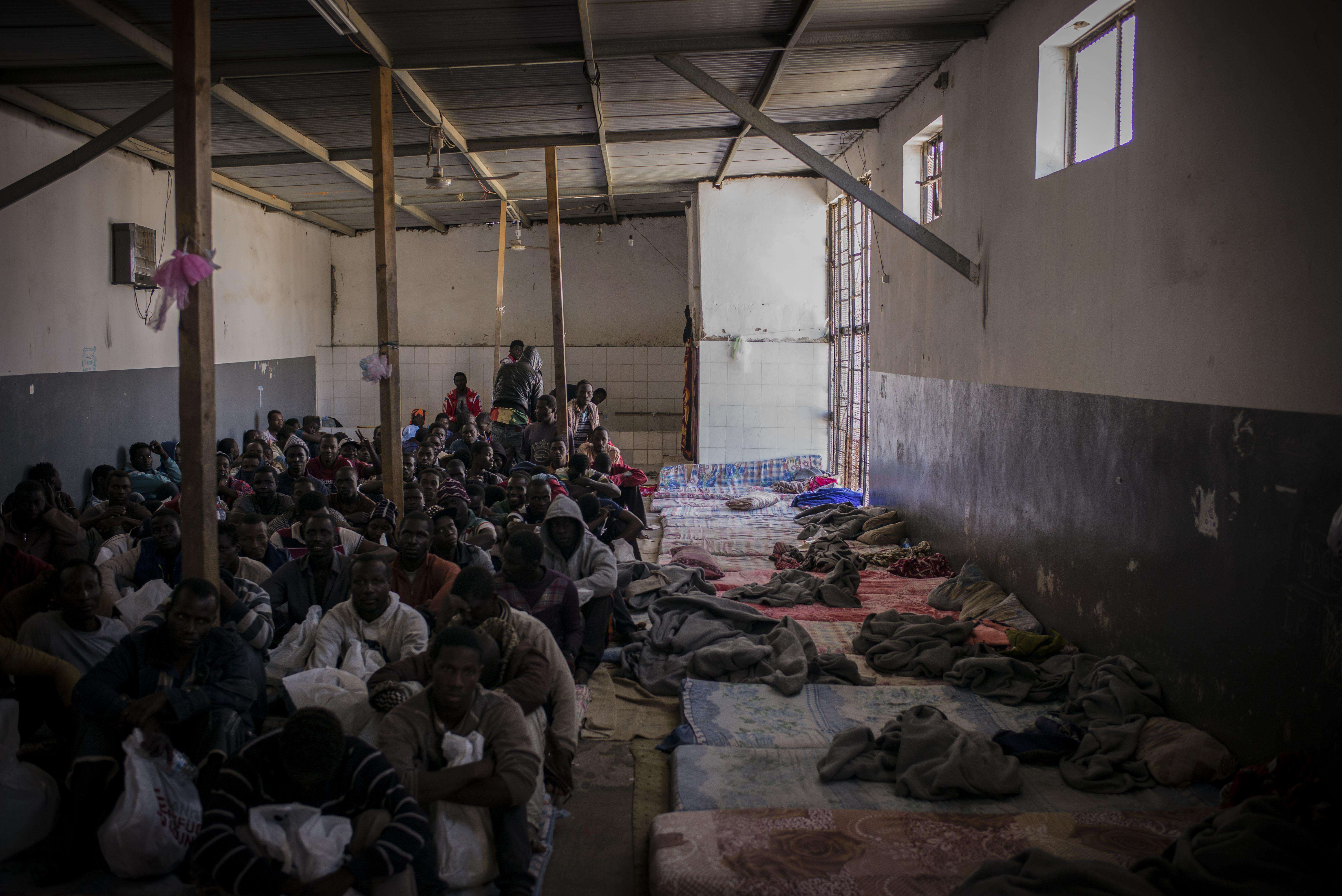TRIPOLI/NEW YORK, OCTOBER 6 2021—The numbers of people held in detention centers in Tripoli, Libya, has tripled in the last five days, after at least 5,000 migrants and refugees were detained during violent mass arrests across the city since October 1, the international medical humanitarian organization Doctors Without Borders/Médecins Sans Frontières (MSF) said today. MSF provides medical care in three detention centers in Tripoli and witnessed many of those detained being held in overcrowded and unsanitary conditions without access to sufficient food, water, shelter, or medical care. MSF calls on the Libyan authorities to stop the indiscriminate mass arrests of vulnerable migrants and refugees, and to release all people unlawfully held in detention centers.
“We are seeing security forces take extreme measures to arbitrarily detain more vulnerable people in inhumane conditions in severely overcrowded facilities,” said Ellen van der Velden, MSF’s operations manager for Libya. “Entire families of migrants and refugees living in Tripoli have been captured, handcuffed, and transported to various detention centers. In the process, people have been hurt and even killed, families have been split up and their homes have been reduced to piles of rubble.”
Many of those captured reported experiencing severe physical violence, including sexual violence, during the raids on their homes. One young migrant was killed and at least five others sustained gunshot wounds, according to the United Nations.
“Armed and masked security men raided our house where I was living with three other people,” said Abdo [name changed to protect anonymity]. “They tied our hands behind our backs and dragged us out of the house. We were pleading for them to give us time to collect our belongings and important papers, but they wouldn’t listen. We were beaten in the process. Some people were beaten on their legs and suffered fractures. They hit me on the head with the butt of a gun and I suffered serious injuries—the doctor had to stitch the wound and wrap it with 10 different dressings. The masked men led us all into vehicles, then we found ourselves in Ghout Sha’al detention center [also known as Al-Mabani]. I was there for four days and experienced a very difficult time, seeing helpless people being beaten with weapons. On the fourth day, I managed to escape. I am free now.”
Those arrested were taken to state-run detention centers and locked up in unsanitary and severely overcrowded cells, with little access to clean water, food, or toilets. Due to the violent nature of the arrests, it is likely that many people need urgent medical care, said MSF.
In the last two days, MSF teams have managed to visit two detention centers in the capital where people arrested in raids are being held: Shara Zawiya and Al-Mabani.
In Shara Zawiya detention center, which normally accommodates 200-250 people, an MSF team witnessed more than 550 women and children crammed into the cells, including pregnant women and newborn babies. Around 120 people were sharing one toilet, while buckets filled with urine were lined up near the doors of the cells. A commotion broke out during a food distribution when the detained women protested the conditions in which they were being held.
In Al-Mabani detention center, MSF teams witnessed hangars and cells so overcrowded that the men inside them were forced to stand. Outside the cells, hundreds of women and children were being held in the open, without shade or shelter. An MSF team spoke to men who said they had not eaten for three days, while several women said all they had received was a piece of bread and a triangle of processed cheese once a day. The MSF team found several men unconscious and requiring urgent medical attention.
During their visit to Al-Mabani, the MSF team witnessed a group of detained migrants and refugees attempting to escape. They were met with extreme violence: the team heard two rounds of heavy gunfire at very close range and witnessed the indiscriminate beating of a group of men, who were later forced into vehicles and driven to an unknown destination.
MSF teams treated 161 patients, including three treated for violence-related injuries, during their limited time at Al-Mabani. They also facilitated the transfer of 21 patients in need of specialist medical care to clinics supported by MSF in Tripoli.
Due to the insecurity caused by the ongoing raids, MSF teams have been unable to run their weekly mobile clinics for vulnerable migrants and refugees across the city. The raids have also impacted people’s ability to move freely around the city and seek medical care, as those who were not arrested are fearful of going outside.
MSF recently resumed medical activities in Shara Zawiya, Al-Mabani, and Abu Salim detention centers in Tripoli after almost three months of suspension following repeated incidents of violence against migrants and refugees held in the facilities. The resumption of MSF’s work followed an agreement with the authorities managing these centers, in which MSF received assurances that certain basic conditions would be met. After this week’s visits, MSF said it is clear that these conditions have not been met.
“Instead of increasing the number of people held in detention centers, efforts should be made to put an end to arbitrary detention and close these dangerous and uninhabitable facilities,” said Van der Velden. “Migrants and refugees are living in danger and are trapped in Libya with very limited options for a way out as humanitarian flights have been unjustifiably suspended for the second time this year.”
MSF urges the Libyan authorities—with the support of relevant organizations—to identify safe and dignified alternatives to detention and allow the immediate resumption of humanitarian evacuation and resettlements flights out of Libya.




